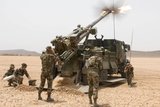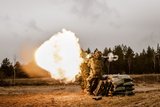US Congress to cut budget of hypersonic programmes
The USN requested $341 million in its FY2024 budget proposal for the first eight CPS rounds. (Photo: USN)
Although the US has been trying to match Russian and Chinese hypersonic capabilities, the House Appropriations Committee recommended cuts and reductions in the budget of programmes in this domain.
The proposal would affect the US Navy’s Conventional Prompt Strike (CPS) and the US Air Force’s (USAF) Air-Launched Rapid Response Weapon (ARRW).
The ARRW is the first USAF hypersonic weapon and is scheduled to be operational in the autumn of 2023. The bill report notes that, ‘while the committee strongly supports investments in hypersonics’, delays and test failures led lawmakers to recommend eliminating funding for this effort in FY2024
Already have an account? Log in
Want to keep reading this article?
More from Defence Notes
-
![Venezuela prepares personnel and equipment for a potential second US attack]()
Venezuela prepares personnel and equipment for a potential second US attack
Defence Minister Gen Vladimir Padrino López has declared that the Venezuelan armed forces “will continue to employ all its available capabilities for military defence”.
-
![How might European countries look to tackle drone incursions?]()
How might European countries look to tackle drone incursions?
Disruption of infrastructure in Europe, whether by cyberattack, physical damage to pipelines or uncrewed aerial vehicles flying over major airports, as has happened more recently, is on the rise. What is the most effective way of countering the aerial aspect of this not-so-open warfare?
-
![Taiwan approved for $11 billion weapon purchase from US]()
Taiwan approved for $11 billion weapon purchase from US
The US State Department’s approval of a multi-billion-dollar sale of weapons to Taiwan includes tactical mission networks equipment, uncrewed aerial systems, artillery rocket systems and self-propelled howitzers as well as anti-tank guided missiles.
-
![Ireland spells out $2.3 billion shopping list in five-year defence spending plan]()
Ireland spells out $2.3 billion shopping list in five-year defence spending plan
Ireland’s multi-annual investment in capital defence spending is set to rise from €300m in 2026 to €360m in 2029–2030 with major upgrades across land, air, maritime and cyber domains.
-
![Canada to deepen integration of multi-domain capabilities to strengthen its defences]()
Canada to deepen integration of multi-domain capabilities to strengthen its defences
The Canadian Department of National Defence has created new organisations to manage the procurement and integration of all-domain solutions and allocated US$258.33 million to strengthen production capacities.

























